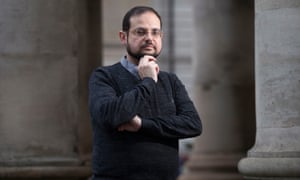Experience: I made bombs for al-Qaida
In 1998, two US embassies were bombed, killing 200 Africans. I no longer wanted to be part of it
I grew up in Saudi Arabia, the youngest of six brothers. By the time I was 13, I had lost both my parents: my father in a traffic accident and my mother to a brain aneurysm.
Not long after they died, in 1992, the Bosnian war began. The evening news detailed atrocities perpetrated against defenceless Muslims, and the papers praised the bravery of the Saudi men who went to fight alongside them. My eldest brother had lectured us on the importance of fighting in defence of Islam, and when I learned that a childhood friend had decided to join the Bosnian mujahideen, I felt someone was paving the way for me.
I found the training empowering. A few weeks earlier I’d been a bookish nerd living in a conservative police state. Now I was in a training camp, high in the mountains, holding my first AK-47. It was intoxicating. I became a committed jihadist – when we were shot at, the adrenaline would take over and I’d retaliate. Always, I was willing to die. In the back of my mind, was the thought: this could be the day I cross into eternal bliss.
I met al-Qaida’s Khalid Sheikh Mohammed, who would go on to mastermind 9/11, at a wedding after the Bosnian war ended, where he spoke passionately about the need to rid the Muslim world of American influence. He persuaded me to begin training with them. Before the year was out I had met Osama bin Laden and sworn an oath of allegiance.
Still only 19, I was put to work training new recruits who often lacked even basic knowledge of Islamic theology and history. Many enrolled just to escape dire poverty in Yemen. Later, I made explosives and chemical and biological weapons. I was fascinated by the science, and pushed the potential consequences out of my mind. I thought these bombs were to be used on US military bases in the Middle East, and the possibility of civilian casualties never occurred to me.
When news of the bombing of two US embassies in east Africa reached us in 1998, it was a turning point – 200 innocent Africans killed just to get at 12 American diplomats. When I asked an al-Qaida leader how this had been justified, he mentioned a 700-year-old fatwa that excused the killing of civilians. I felt we were twisting our principles past breaking point. I no longer wanted to be part of it.
I used a planned health check-up as a pretext for travelling to Qatar. I had no intention of returning, and it was a relief when I was arrested on arrival for suspected terrorism offences. I confessed immediately to my al-Qaida involvement – as far as I was concerned, this was fate.
I was relocated to the UK for seven months of debriefings. During that time, many of my long-held beliefs were erased by the kindness I was shown. I had been trained to view westerners as animals, yet here I was having meals and lengthy discussions with decent people.
When I was asked to spy on behalf of MI5 and MI6, I agreed straight away. For the next eight years, I travelled regularly between London and Afghanistan: as far as al-Qaida were concerned, I was running money and equipment and helping them recruit in the UK. Instead, I would commit information to memory and smuggled back to MI6 the designs of a device to disperse deadly chemical agents.
I knew the risks, and had sleepless nights. But my time as a double agent didn’t end until 2006, when classified information about my work was leaked to journalists, and information that inadvertently blew my cover was published in Time magazine. I learned this while on holiday, when I got a text from an al-Qaida colleague saying, “There is a spy among us.” They hadn’t realised the spy was me.
Eventually, a fatwa was issued against me, and three years ago security services uncovered a plot to kidnap and murder me, hatched by a former al-Qaida ally. By that time I was married and my wife was five months’ pregnant. But I have no regrets about working for the west – I know planned attacks were foiled thanks to the intelligence I gathered, and many lives were saved.
I still live in the UK, and co-host a podcast using my experience to shine a light on the Middle East; I also work as a security consultant. I will never feel entirely safe, but I take what precautions I can.
• As told to Chris Broughton
